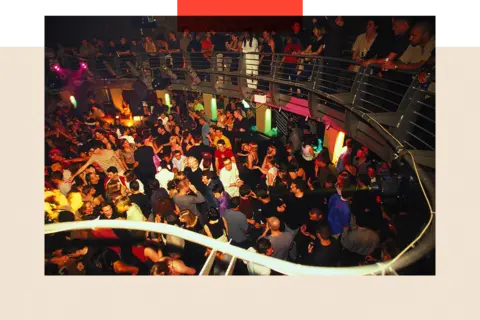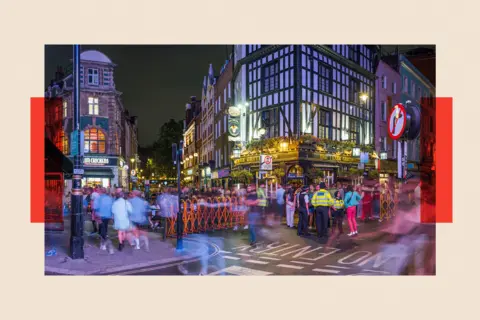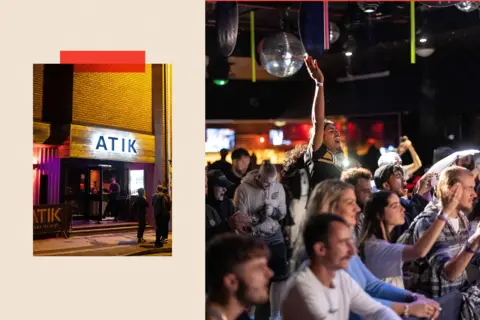The end of hedonism? Why did Britain return to the clubs?

BBC News
 BBC
BBCIn a old weapon barrel factory in Sheffield’s industrial heart, hundreds of people boast of one of the Hope Works of Hope Works Club for one of the recent times before closing. A young woman was dressed in black to show the loss of “her favorite place”.
“This is a turning point of Sheffield,” he says. “This is why many people come to university here,” he adds.
The owner Liam O’sshea believes that nightlife places like this is “everything is life scribble”.
“Where people find themselves, or he says. “Where people find their tribes.”
Mr. O’Shea, who calls himself the child of “Rave Generation”, began his hope because he wanted to touch the original spirit. Just now, Hope Works is gone. 13 years later he closed his doors permanently in February.
And according to Mr. O’s, the base clubs in the UK – places where future artists often perform live – falls like flies “.
 BBC İPLAYER
BBC İPLAYERIn the last five years, about 400 clubs have been closed in the UK – more than one third of the total number.
In London, a special task force is being launched by the mayor to help increase nightlife and save places under the risk of closing.
“A complex factor matrix is pressing the industry and pressing the industry, making a perfect storm for nightclubs,” he says.
There are many factors in the game – increasing costs between them, less disposable income and changing lifestyle choices.
However, closing also offers wider questions. Some experts, for example, suggested that the permanent effect of Covid-19 locks may have led to less than people once.
And if that’s the case, can the closure of so many clubs shake his head to a wider cultural change between the Z generation?
Did he change a generation?
For several years during the pandemi, young people could not experience nightlife as the previous generations, so perhaps it is not surprising that they have been socialized as they have been socialized since then.
A recent Night Industry Association (NTIA) found that more than 2,000 people work between the ages of 18-30, about two-thirds of them were less frequently than the previous year.
Psychologist from Elizabeth Consultancy. Elizabeth Feigin says Gen Z has been directed by a number of facts that are both offline and online. Some of this seems to be a rising consciousness around both physical and mental health – as well as “we see less drinking culture”.
A Yougov questionnaire between the ages of 18 and 24 shows that Gen Z is generally the most sober group and 39% do not drink alcohol.
 Getty Images
Getty ImagesDr. Meg Jay, the author of the decisive decisive year, shows that there are several factors that guide this change. “Some of them imagine that young people have gone out after less escape, but they are still sitting in their rooms, and I don’t think this is the case.”
The authority says there are more awareness about messaging on social media around the dangers of the substances and healthy lifestyles.
Less socializing – or is it different?
When locking restrictions are applied, Dr. Jay remembers some young customers saying that they should find new ways to have a good time. “[I had] Customers told me that they were drunk, dating or broken, and spending less time to feel more time responsible for their lives. “
Of course, social media also plays a role in socialization. For some, “messaging with social media and friends draws the itching of the meeting”.
This is true with Mr. Rigg. “We have a great addiction to social media that drives us away from more social entertainment.”
However, Dr Feigin believes that the delay in social communication in young generations has come before locks. “I think he worsened by his pande. But I think it was already diminishing behind social media and technology and helicopter parents.”
The decline in nightlife may have some healthy reasons, and he thinks that there is a “some damage”.
 Getty Images
Getty Images“[This is] Potentially, mental health, social anxiety, loneliness, and people do not actually go out and have socialization skills – because it has become too much dependent online. “
He continued: “Young people’s face -to -face socializations are becoming increasingly difficult … I think we see higher social anxiety and high loneliness rates”.
Is a ‘storm’ coming for clubs?
Not everyone was convinced that club closures were the cause. Michael Kill, General Manager of Time Industries Association at night, thinks that finance plays a major role. “The truth is that people can’t meet it.”
Entry fees vary depending on the club. Early version tickets in some city centers can be around £ 10, while entrance or last -minute tickets at the door will probably be more. Then, any drinks, taxis, kebab shops come late at night.
In an NTIA study, 68% of people reported how much the current economic climate has emerged.
“Clubbing is luxurious, and it’s just crazy,” he says, ” “You should be able to enter a club at any time and be with your friends because it’s something that makes you happy.”
Mr. Rigg argues that there is a “storm” for clubs as a result of new economic challenges such as national insurance marches.
If clubs cannot absorb economic challenges and increase prices, this can make them a less affordable and less attractive suggestion, especially at a time when consumers are loaded with increasing living costs.
 Getty Images
Getty ImagesIn 2024, the company, which has two well -known nightlife chains, Pryzm and Atik, entered the administration. He closed 17 and sold 11 venues (including clubs and bars) and showed changing student habits as the reason for closing.
Rusell Quelch, CEO of Neos, who manages the remaining places, believes that students have less money than before. “People really care about how they spend their money.” “The days when the students go out four or five nights a week.”
The company has a few “party bar” that is now open during the day, so the trade window is longer. Many of them are the themed, with events such as bingo and are not focused on alcohol.
Plans that disrupt your trend
Acapulco in Halifax has seen thousands of people on the dance floor since it was opened in 1961. England is thought to be the oldest nightclub. The bar is illuminated as red and blue, and when people fall to dance, they usually pass through the gates of the music for a few nights in a row.
But the owner Simon Jackson noticed some changes in the way people go to the club. Some will come before you start properly at night and will film themselves while dancing for Tiktok.
Acca, as it is known as locally, challenges its surroundings. In Yorkshire, 40 percent of clubs have been closed from any region in the UK since 2020. Mr. Jackson ties the club’s long life – in a challenging market – as “value for money” as well as other things.
There are other club models that receive some success.

Gut Level, a community project led by Queer at night at Sheffield, was built on a low -income membership model for low -income ones.
“The music scene worked hard by men, and perhaps not thinking about the safety of people like women and queer people.”
Then there is a security direction. In 2023, more beverages in bars (41%) and clubs (28%) have occurred, and many people say they had sexual violence overnight.
“This is about the safety of the members,” says Katie Matthews – at the intestinal level, people should register in advance.
Ultimately, many clubs that continue to develop do so because they are built around a sense of community. DJ Ahad Elley (known as Ahadadream), who moved from Pakistan to England at the age of 12, believes that this is a valuable aspect of many clubs.
“For some people, they can almost go and feel a sense of belonging and real community, or he says.
Why is it important to protect clubs?
Cat Rossi spent years by investigating the creative importance of nightclubs as a design historian and professor of architecture for Creative Arts Canterbury. Iz We must go out since the beginning of civilization and dance and be together at night, or he says. “Social gathering is a basic part of social tissue.
“I think nightclubs are really worthless in these extremely creative architecture and design forms, but nightclubs and club culture are more generally engines of this great creativity.”
Many fashion tags were born in clubs.
 Getty Images
Getty ImagesIn 2016, a German court officially identified Berghain, a famous Berlin nightclub, as a cultural institution that gives the same tax status as the city’s opera houses and theaters.
The following year, Zurich recognized Tekno culture as part of the “intangible cultural heritage” in partnership with UNESCO.
A feeling shared by some in the UK. As Mr. Kill said: “They are a British institution. There are no two ways on this.”
And the key to protecting it and providing the future of nightclubs is evolution, Mr. Rigg.
“Night clubs need to change the business model to maintain their relevance due to cultural behavioral changes and reduce other economic pressures.”
But without this transformation, England is at risk of losing more than them.
Additional Reporting: Laura Lea, Fran Whyte and Harriet Whitehead
Best Picture Loan: Getty Images
BBC Independent With the new perspectives that challenge assumptions and make deep reporting about the biggest problems of the day for the home and the best analysis on the website. And we exhibit thought -provoking content from all over BBC Sounds and Iplayer. You can send us your feedback in the Dextth section by clicking the button below.





